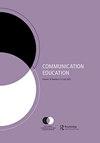Navigating the course integrity/compassionate care dialectic in online teaching and learning
IF 0.8
Q3 COMMUNICATION
引用次数: 3
Abstract
Throughout the 2020–2021 academic year, college instructors struggled with how to accommodate the extenuating circumstances confronting students during the pandemic while, at the same time, maintaining course integrity. Instructors made decisions about accepting late assignments, extending deadlines, and relaxing attendance guidelines for students who became ill, served as caregivers, or lost jobs; as well as those whose work hours suddenly increased as essential workers. The number of students reporting anxiety, depression, or suicidal ideation—already at record high levels in comparison with previous generations—skyrocketed (Son et al., 2020). Instructors were acutely aware that students were struggling, yet also wrestled with soaring instances of academic dishonesty and waning levels of student engagement. Many openly wondered whether learning outcome achievement was even comparable with pre-pandemic norms (Donnelly et al., 2020). In response, we propose that learning efficacy in online environments—as exposed during the 2020 pandemic—may be achieved best by approaching our pedagogy within an ethic of care (Gilligan, 1982). Gilligan (1982) conceptualized the ethic of care (EoC) cogently in her book, In a Different Voice. She and others argue that moral action and ethical responses be tailored to individuals based on the unique challenges imposed on them by their unique lived experiences. As such, Gilligan’s EoC represents a radical departure from Kohlberg’s (1969) unified theory of moral psychology, which focuses on the extent to which a given practice promotes justice or fairness. Justice/fairness and caring were separate foundations for ethics (Haidt & Graham, 2007). The challenges teachers faced in balancing course integrity and caring during the pandemic is not new, but its salience intensified as we navigated what many now fondly refer to as “pandemic pedagogy.” We argue that instructional communication pedagogy can be transformed in ways that maintain course integrity while enacting what we call a compassionate care pedagogy through “deep teaching.” Deep teaching considers each student holistically, thereby engendering a love of learning that transcends merely accomplishing assignments and earning grades (Miller, 1999). Deep teaching sets high expectations and guides each student to overcome potential obstacles arising from their lived experiences. As such, deep teaching is a manifestation of a compassionate care pedagogy grounded in an EoC (Gilligan, 1982). As teachers acknowledge these obstacles through a在线教学中的课程诚信/同情心辩证导航
在整个2020-2021学年,大学教师都在努力适应学生在疫情期间面临的可减轻的情况,同时保持课程的完整性。对于生病、照顾他人或失业的学生,教师可以决定接受迟交的作业、延长截止日期,以及放宽出勤要求;以及那些工作时间突然增加的关键工人。与前几代人相比,报告焦虑、抑郁或自杀念头的学生人数已经达到了创纪录的高水平,这一数字直线上升(Son et al., 2020)。教师们敏锐地意识到学生们在努力,但同时也在努力应对学术不诚实行为激增和学生参与度下降的问题。许多人公开怀疑,学习成果的成就是否与大流行前的标准相当(Donnelly et al., 2020)。作为回应,我们建议,在2020年大流行期间暴露的在线环境中,通过在关怀伦理中接近我们的教学方法,可以最好地实现学习效率(Gilligan, 1982)。Gilligan(1982)在她的书《in a Different Voice》中将关怀伦理(EoC)概念化得很有说服力。她和其他人认为,道德行为和伦理反应是根据个人独特的生活经历强加给他们的独特挑战而量身定制的。因此,吉利根的EoC代表了对Kohlberg(1969)道德心理学统一理论的彻底背离,该理论关注的是特定实践在多大程度上促进了正义或公平。正义/公平和关怀是伦理学的独立基础(Haidt & Graham, 2007)。在大流行期间,教师在平衡课程完整性和关怀方面面临的挑战并不新鲜,但随着我们采用许多人现在亲切地称之为“大流行教学法”的方法,这种挑战变得更加突出。我们认为,教学交流教学法可以在保持课程完整性的同时,通过“深度教学”实现我们所谓的“慈悲关怀教学法”。深度教学从整体上考虑每个学生,从而产生对学习的热爱,而不仅仅是完成作业和获得成绩(Miller, 1999)。深度教学设定了很高的期望,引导每个学生克服他们生活经历中产生的潜在障碍。因此,深度教学是基于EoC的慈悲关怀教学法的一种表现(Gilligan, 1982)。当教师承认这些障碍,通过一个
本文章由计算机程序翻译,如有差异,请以英文原文为准。
求助全文
约1分钟内获得全文
求助全文
来源期刊

COMMUNICATION EDUCATION
EDUCATION & EDUCATIONAL RESEARCH-
CiteScore
3.10
自引率
34.80%
发文量
47
期刊介绍:
Communication Education is a peer-reviewed publication of the National Communication Association. Communication Education publishes original scholarship that advances understanding of the role of communication in the teaching and learning process in diverse spaces, structures, and interactions, within and outside of academia. Communication Education welcomes scholarship from diverse perspectives and methodologies, including quantitative, qualitative, and critical/textual approaches. All submissions must be methodologically rigorous and theoretically grounded and geared toward advancing knowledge production in communication, teaching, and learning. Scholarship in Communication Education addresses the intersections of communication, teaching, and learning related to topics and contexts that include but are not limited to: • student/teacher relationships • student/teacher characteristics • student/teacher identity construction • student learning outcomes • student engagement • diversity, inclusion, and difference • social justice • instructional technology/social media • the basic communication course • service learning • communication across the curriculum • communication instruction in business and the professions • communication instruction in civic arenas In addition to articles, the journal will publish occasional scholarly exchanges on topics related to communication, teaching, and learning, such as: • Analytic review articles: agenda-setting pieces including examinations of key questions about the field • Forum essays: themed pieces for dialogue or debate on current communication, teaching, and learning issues
 求助内容:
求助内容: 应助结果提醒方式:
应助结果提醒方式:


